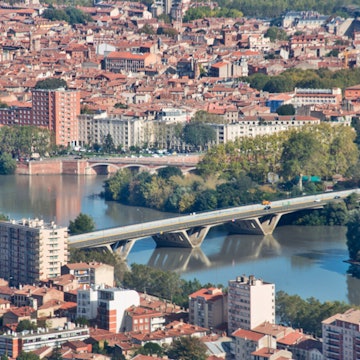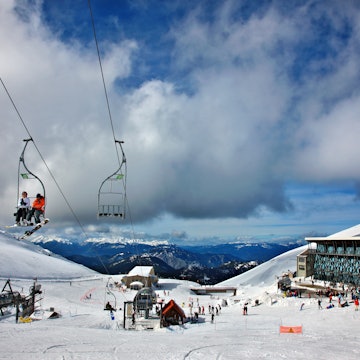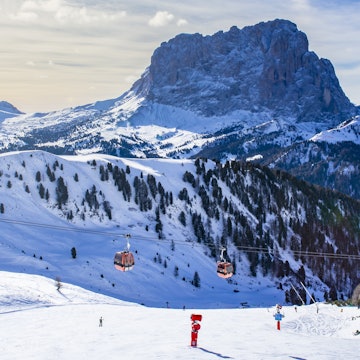

SANTA CLARA, CALIFORNIA - MAY 12: Mallory Pugh #2 of United States takes a shot against South Africa during their International Friendly at Levi's Stadium on May 12, 2019 in Santa Clara, California © Robert Reiners / Getty Images
The Women’s World Cup is being held in France from 7 June to 7 July this year, and football fans from around the world are expected to fill stadiums, bars and restaurants across the country. Here's what you can expect to see and do in the nine host cities when you're not at a game.

Paris
The capital city is awash with world-class landmarks such as the Eiffel Tower, Arc de Triomphe and Sacré-Cœur. Art-lovers should book ahead online for the Louvre to guarantee entry within 30 minutes. But an integral part of Paris' attraction is simply flânerie – city strolling without any particular destination in mind.
Where's the match?
Parc des Princes will host seven matches through the tournament, with France v Korea – the inaugural match of the competition – on 7 June.
Rennes
Rennes’ stately centre is elaborate and the medieval quarter, full of half-timbered houses, is a joy to get lost in. At night, this student city has plenty of lively places to stop for a drink (head for rue St-Michel), and a superb selection of restaurants along rues St-Malo and St-Georges.
Where's the match?
Roazhon Park will host seven matches through the tournament, starting with Germany v China on 8 June.
Le Havre
The Unesco World Heritage city of Le Havre is a love letter to modernism, evoking France’s postwar energy and optimism. Attractions include Musée Malraux, full of enchanting impressionist paintings, and the soaring modernist church Église St-Joseph, with its captivating stained-glass tower. There are a few bars around town, but for a sunset drink it’s worth heading to the seafront promenade.
Where's the match?
Stade Océane hosts seven matches through the tournament, starting with Spain v South Africa on 8 June.

Reims
Reims was meticulously restored following WWI and WWII and is endowed with handsome pedestrian boulevards and several art-deco sites. You can’t miss the gargantuan Gothic cathedral, which rises above the city. Reims is an important centre of Champagne production, and naturally, a glass of bubbly is the tipple of choice here. Look for lively bars and cafes around place Drouet d’Erlon, rue Chanzy and place du Forum.
Where's the match?
Stadte Auguste-Delaune hosts six matches through the tournament, starting with Norway v Nigeria on 8 June.
Valenciennes
Valenciennes sits in the north of France, approx 15km from the Belgian border. The city’s Musée des Beaux-Arts is stocked with 17th-century works by Flemish painters as well as sculptures from the 19th century. Head to the large sculpture garden at the centre of the building for more contemporary works.
Where's the match?
Stade du Hainaut hosts six matches through the tournament, starting with Australia v Italy on 9 June.
Grenoble
Grenoble in the Alps unites the joys of the city with breathtaking nature. Take the cable car over the Isère River to Fort de la Bastille for incredible views over the mountains, then head to Musée de Grenoble in the city centre for displays of European art, or the highly impressive Musée Archéologique to discover the secrets of a 12th-century church and cloister. The historic quarter is lined with cafes and shops, and good bars can be found scattered throughout the city.
Where's the match?
Stade des Alpes hosts five matches through the tournament, starting with Brazil v Jamaica on 9 June.
Nice
Nice has old-world opulence, lively street life, year-round sunshine and an impressive seaside location. It’s the perfect hybrid of French and Italian culture. Wander the dark, narrow, winding alleyways of Nice’s old town, past delis and bars, to cours Saleya, a massive market square. Find time for people-watching astride a blue chair on the Promenade des Anglais.
Where's the match?
Stade de Nice hosts six matches through the tournament, starting with England v Scotland on 9 June.
Montpellier
The university town of Montpellier in the south of France has the oval-shaped place de la Comédie at its heart. Explore the medieval streets packed with designer shops, and stop by the Musée Fabre with displays of sculpture, paintings and other artworks from the 14th to 21st centuries.
Where's the match?
Stade de la Mosson hosts five matches through the tournament, starting with Canada v Cameroon on 10 June.

Lyon
Lyon packs in an awful lot: fantastic museums, busy drinking and nightlife scenes, and superb shopping lend it a sophisticated vibe. It’s a great spot for adventurous foodies to indulge in their wildest gastronomic fantasies. Be sure to visit a bouchon (small bistro) to sample Lyonnais specialities and stop by Lyon’s famed indoor food market.
Where's the match?
Stade de Lyon hosts the semi-finals (2 and 3 July) and the final (7 July).
Heading to the Champions League final on 1 June? Find out what Madrid has to offer when you're not at a match.
https://shop.lonelyplanet.com/products/france-travel-guide-13















